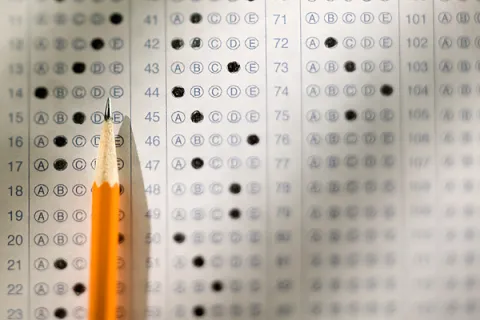
This March, CRLS hosted the tenth grade English MCAS, the first of the kind since the removal of MCAS as a statewide graduation requirement. Now, besides one scholarship offer, there is no motive for students taking the test. The sole purpose of the assessments is to see if schools are meeting benchmarks for English, Math, and Science. But with no incentive for the students, it is doubtful whether the MCAS still provides an accurate assessment of student performance. In addition, there are mounting funding cuts for the Massachusetts Department Of Education (DOE), which administers MCAS testing. All of this points to a future with fewer statewide standards for student achievement, leaving educational standards up to the individual districts and schools.
In November 2024, Massachusetts voters passed a resolution to remove MCAS as a graduation requirement. It’s now left up to the individual school districts to decide their criteria for graduation. Despite 59% voter support, critics worried that removing the state standard would cause low-performing schools to further lower expectations. As Harvard professor and MCAS proponent Irvin L. Scott told The Harvard Crimson, “I just never believed in taking away a challenge or lowering a standard because someone’s struggling to meet the standard, I think it’s on the system to provide adequate supports to ensure that they meet the standards.” Previously, students who failed the MCAS, but still met the district requirements for graduation, were given a “certificate of attainment” instead of a standard diploma.
Now that the resolution has passed, students at CRLS who have failed the MCAS are, in the eyes of the school, no different from those who have passed it. The only real incentives that remain are the “John and Abigail Adams” scholarship offer, worth up to $1,700 at select Massachusetts state universities, and the score report sent to parents. This lack of motivation has been impactful at CRLS, where some tenth graders opted-out of March’s English MCAS. “It’s pointless,” Temelko Dymek ’27 told the Register Forum, “I was fortunate enough to opt-out and to have better things to do with my time.”
The main use of MCAS in the foreseeable future is that of a data-collection scheme for the state to evaluate schools. However, there has been ongoing debate about this. “If there’s no incentive, then the schools shouldn’t be surprised if nobody shows up,” Filip Knippen ’27 told the Register Forum, continuing to say that “the state should either remove it entirely or make it required, because if it’s not then it won’t be an accurate benchmark.”
However, that decision may be made for the state not too long from now. In the midst of President Donald Trump’s budget cuts, the Department of Education has come under fire. Due to this, the Massachusetts DOE is facing a potential two billion dollar cut in the coming years. The department signed a $180 million contract for the next five years, amounting to over $30 million per year to administer MCAS across the state. With cuts on the table, the now-unreliable MCAS could end up on the chopping block.
Ultimately, the future of MCAS remains uncertain for the time being. It may continue in its current, limited role, or it could be phased out entirely as funding and interest wane. Only time will tell.













